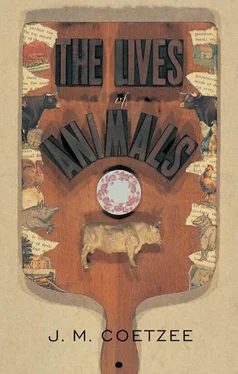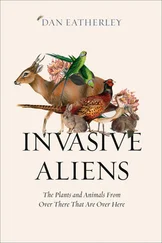The Lives of Animals
♦ J. M. COETZEE ♦
MARJORIE GARBER
PETER SINGER
WENDY DONIGER
BARBARA SMUTS
♦
EDITED AND INTRODUCED BY AMY GUTMANN
INTRODUCTION
♦
Amy Gutmann
♦
“ SERIOUSNESS is, for a certain kind of artist, an imperative uniting the aesthetic and the ethical,” John Coetzee wrote in Giving Offense: Essays on Censorship . In The Lives of Animals , the 1997–98 Tanner Lectures at Princeton University, John Coetzee displays the kind of seriousness that can unite aesthetics and ethics. Like the typical Tanner Lectures, Coetzee’s lectures focus on an important ethical issue—the way human beings treat animals—but the form of Coetzee’s lectures is far from the typical Tanner Lectures, which are generally philosophical essays. Coetzee’s lectures are fictional in form: two lectures within two lectures, which contain a critique of a more typical philosophical approach to the topic of animal rights. Coetzee prompts us to imagine an academic occasion (disconcertingly like the Tanner Lectures) in which the character Elizabeth Costello, also a novelist, is invited by her hosts at Appleton College to deliver two honorific lectures on a topic of her choice. Costello surprises her hosts by not delivering lectures on literature or literary criticism, her most apparent areas of academic expertise. Rather she takes the opportunity to discuss in detail what she views as a “crime of stupefying proportions” that her academic colleagues and fellow human beings routinely and complacently commit: the abuse of animals.
Coetzee dramatizes the increasingly difficult relationships between the aging novelist Elizabeth Costello and her family and professional colleagues. She progressively views her fellow human beings as criminals, while they think that she is demanding something of them—a radical change in the way they treat animals—that she has no right to demand, and that they have no obligation or desire to deliver. In the frame of fiction, Coetzee’s story of Elizabeth Costello’s visit to Appleton College contains empirical and philosophical arguments that are relevant to the ethical issue of how human beings should treat animals. Unlike some animals, human beings do not need to eat meat. We could—if only we tried—treat animals with due sympathy for their “sensation of being.” In the first of her lectures (the main part of Coetzee’s first lecture), Costello concludes that there is no excuse for the lack of sympathy that human beings display toward other animals, because “there is no limit to the extent to which we can think ourselves into the being of another. There are no bounds to the sympathetic imagination.” Yet most human beings do not stretch the bounds of our imaginations with regard to animals, because we “can do anything [with regard to animals] and get away with it.”
We have closed our hearts to animals, Costello concludes, and our minds follow our hearts (or, more strictly speaking, our sympathies). Philosophy, she argues, is relatively powerless to lead, or in any event to lead in the right direction, because it lags our sympathies. This places the burden on something other than our rational faculties, to which philosophy typically appeals. Our sympathetic imaginations, she argues—to which poetry and fiction appeal more than does philosophy—should extend to other animals. The fictional form, in Coetzee’s hands, therefore appears to have an ethical purpose: extending our sympathies to animals. If fiction does not so extend our sympathies, then neither will philosophy. If it does, then perhaps philosophy will follow.
Costello’s lectures within Coetzee’s lectures therefore ask their audience to “open your heart and listen to what your heart says.” Do animals have rights? Do human beings have duties toward them regardless of whether they have rights? What kind of souls do animals have? What kind do we have? Costello does not answer these questions in her lectures, because they are too philosophical for the immediate task at hand. They presume that the mind can lead the heart, a presumption that Elizabeth Costello’s experience has led her to reject after a long life of trying to convince other people of her perspective on animals. In any case, as Costello tells her audience at Appleton, “if you had wanted someone to come here and discriminate for you between mortal and immortal souls, or between rights and duties, you would have called in a philosopher, not a person whose sole claim to your attention is to have written stories about made-up people.”
Coetzee stirs our imaginations by confronting us with an articulate, intelligent, aging, and increasingly alienated novelist who cannot help but be exasperated with her fellow human beings, many of them academics, who are unnecessarily cruel to animals and apparently (but not admittedly) committed to cruelty. The story urges us to reconceive our devotion to reason as a universal value. Is the universe built upon reason? Is God a God of reason? If so, then “man is godlike, animals thinglike.” But Elizabeth Costello vehemently dissents from this anthropocentric perspective: “reason is neither the being of the universe nor the being of God. On the contrary, reason looks to me suspiciously like the being of human thought; worse than that, like the being of one tendency in human thought.”
Does Costello protest too much? Although she argues that philosophy is totally bankrupt in its ability to make our attitudes toward animals ethical, Costello also self-consciously employs philosophy in her lectures, often to demonstrate the weakness of those philosophical arguments that consider the lives of non-reasoning beings less valuable by virtue of their being less reasoning. “What is so special about the form of consciousness we recognize that makes killing a bearer of it a crime,” she asks, “while killing an animal goes unpunished?” Unlike philosophers, poets begin “with a feel for” an animal’s experience. That leads them to recognize the crime of killing any animal that can experience the sensation of being alive to the world. Costello urges us to recognize the accessibility of such sympathy for the fullness of animal being. “If we are capable of thinking our own death,” she asks, “why on earth should we not be capable of thinking our way into the life of a bat?”
What, then, is the motivation for thinking our way into the lives of animals, if not morality? By her own account, however, Costello is motivated not by moral conviction but rather by “a desire to save my soul.” She is not so presumptuous as to think that she has succeeded in saving her soul, although she does treat her critics as if they had lost sight of their souls. She refuses to accept the compliments of the president of Appleton College, who (in an apparent attempt to defuse the mounting tension) says that he admires her way of life. In response, Costello points out that she wears leather shoes and carries a leather purse. “Surely one can draw a distinction between eating meat and wearing leather,” the president offers in her defense. “Degrees of obscenity,” is Costello’s uncompromising reply. The president has succeeded only in increasing the tension. Costello refuses to take admiration for an answer. Her sensibilities and actions may be superior to those of her fellow human beings, but they remain nonetheless a source of internal agony.
Costello is self-aware. She anticipates her most antagonistic critic by saying that she knows “how talk of this kind polarizes people, and cheap point-scoring only makes it worse.” The kind of talk to which she refers is an analogy, which she draws again and again, between the way her fellow human beings treat animals and way the Third Reich treated Jews. “By treating fellow human beings, beings created in the image of God, like beasts,” she says of the Nazis, “they had themselves become beasts.” She continues: “we are surrounded by an enterprise of degradation, cruelty, and killing which rivals anything that the Third Reich was capable of….”
Читать дальше












